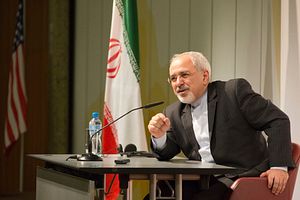The Afghanistan-Iran relationship is bolstered by extensive historical ties and colored by the colonial powers and conflicts in the neighborhood both countries share. Iran’s support for the Northern Alliance severely strained relations between the two countries when Afghanistan was ruled by the Taliban. The 9/11 attacks and the U.S. invasion of Afghanistan also brought a significant change: Iran supported the state-building process and participated in the Bonn Conference on Afghanistan, leading to a dramatic improvement in the relationship.
The latest event that will have a major impact on the region is the Joint Comprehensive Plan of Action. This agreement between the five permanent members of the UN Security Council, Germany, and Iran on the latter’s nuclear program, will significantly shape the Iran-Afghanistan relationship.
Specifically, the Iran nuclear deal will likely have a major impact in two key areas of the bilateral relationship: trade and security. Economically, Afghanistan stands to gain from the Iran nuclear deal. With sanctions lifted and Iran reintegrating into the global economy, Afghanistan will benefit from increased dealings with Iran in the short term and has prospects of developing into a transport hub for regional trade in the long term. In the security realm, Iran could prove a vital ally for Afghanistan in combating narco-trafficking originating in Afghanistan and in balancing against Pakistani influence in Afghan security matters.
Bilateral economic relations are already growing, with Afghanistan courting Iranian investment. According to an Iranian state news agency IRNA report from March, Afghanistan agreed to a customs exemption for Iranian businesses that relocate to the country. The same day, Iran and Afghanistan signed a mining agreement that gives Iranian companies access to Afghan mineral resources. As Iran and Afghanistan become economically tied to one another, so too will security ties begin to take a more formal shape. The Iranian government may also increase its funding of development projects in Herat province, a strategic hub close to the Iranian and Turkmen borders, where Iranian investment since the fall of the Taliban regime has been a stabilizing influence.
After Iran sees relief from more than a decade of sanctions, its open economy stands to benefit Afghanistan by turning the latter into a regional trading power. With the unfreezing of billions of dollars in assets, trade will become more straightforward. Countries will no longer have to circumvent rules and regulations that isolate Iran from the formal financial system and, perhaps, even offer the opportunity to build direct trade routes. India is likely to develop the Iranian port of Chabahar, presenting an opportunity for Afghanistan to diversify trading partners and generate billions of dollars in trade revenue.
Regional economic integration also offers an opening for countries to come together and pursue security interests. Iran stands to emerge as an important trade route to Central Asia and Europe: the country has unparalleled land and sea rights to Central Asia. As Iran seeks to polish its image on the international stage, there could be a unique opportunity to pursue joint security efforts in the region that benefit all parties, including the United States, especially against the narco-trafficking groups that bedevil Iranian, Afghan, and U.S. officials alike.
The Afghanistan-Iran connection over drugs is a complex relationship that has persisted over the past several decades. Iran is desperately trying to reshape its identity as a drug transit country. Narcotics trafficking from Afghanistan has created a chronic drug problem in Iran, which has blamed the Afghan government and the United States for failing to curb opium production. Iran also serves as a major corridor for shipping narcotics to Europe and the Persian Gulf. Opium use has increased alarmingly in Iran, while revenues from narcotics have financed much of the anti-American insurgency in Afghanistan. Thousands of Iranian security agents have been killed in clashes with drug rings. Several claim that Jundallah, a terrorist group responsible for killing scores of Iran’s Revolutionary Guards, is closely tied to drug trafficking rings. Thus, addressing narco-trafficking in Afghanistan will serve as an effective point of collaboration between the United States, Iran, and Afghanistan; one where political will, through enforcement efforts, could be explicitly demonstrated.
Despite the country’s strident anti-Western rhetoric, Iran has more in common with the United States than Pakistan in securing Afghanistan’s stability in the long run. Iran, like the United States, would prefer an Afghanistan devoid of the influence of militant Sunni groups. The question remains of how to forge this partnership given current relations with Pakistan. The underpinnings of the Iran-Afghanistan relationship capitalizes on linguistic, cultural, and religious ties and such a links could be a catalyst for the two countries as they rebuild and strengthen ties post-Taliban. Capitalizing on the historical and cultural ties between Afghanistan and Iran also creates a path for partnership that curbs the influence of Pakistan, an unwieldy counterterrorism partner in the region, and bolsters Iran as a reliable security partner, vested in Afghanistan’s stability.
Iran is on the economic rebound and reshaping the geopolitical context of its neighbors, particularly Afghanistan. With this renewed bilateral engagement, there are opportunities for greater cooperation along shared trade and security interests, which could have positive implications for the entire region. Thus, at least with respect to the Iran-Afghanistan relationship, Iran’s rise should be seen as an opportunity to bolster regional security.
Sarah Lohschelder is pursuing a Master of Science in Foreign Service and a Juris Doctor at Georgetown University. She is a Defense Fellow at Young Professionals in Foreign Policy.
Amanda Zeidan is pursuing a Master of Science in Foreign Service at Georgetown University, where she is pursuing a concentration in Global Business and Finance. She is currently an Allen W. and Allen M. Dulles Graduate Fellow at the Institute for the Study of Diplomacy and a Middle East Fellow at Young Professionals in Foreign Policy.

































